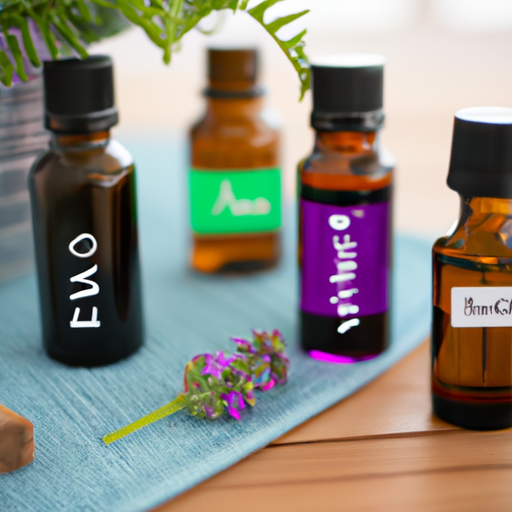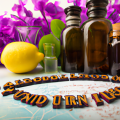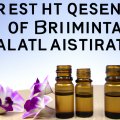-
Table of Contents
- Introduction
- What Essential Oils are Safe to Use Around Children?
- How to Use Essential Oils Safely in the Home
- What are the Benefits of Using Essential Oils?
- What are the Risks of Using Essential Oils?
- How to Choose the Right Essential Oil for Your Needs
- How to Store Essential Oils Safely
- What are the Best Essential Oils for Aromatherapy?
- Q&A
- Conclusion
Introduction
Essential oils are a popular natural remedy for a variety of ailments, but not all essential oils are created equal. Some essential oils can be dangerous if used incorrectly, while others are considered safe for use. In this article, we will discuss what the safest essential oils are and how to use them safely. We will also discuss the potential risks associated with using essential oils and how to avoid them. Finally, we will provide some tips for selecting the best essential oils for your needs.
What Essential Oils are Safe to Use Around Children?
When using essential oils around children, it is important to be aware of the safety guidelines. Essential oils can be used safely around children, but it is important to use them with caution.
The most important safety guideline is to always dilute essential oils before using them on children. Essential oils should be diluted with a carrier oil, such as coconut oil, jojoba oil, or almond oil. The recommended dilution ratio is 1 drop of essential oil to 1 teaspoon of carrier oil.
It is also important to be aware of the age of the child when using essential oils. Essential oils should not be used on children under the age of 2. For children between the ages of 2 and 6, essential oils should be used in very small amounts and should be diluted more than for adults. For children over the age of 6, essential oils can be used in the same way as for adults, but should still be diluted.
It is also important to be aware of the types of essential oils that are safe to use around children. Some essential oils, such as eucalyptus, peppermint, and rosemary, should not be used on children under the age of 10. Other essential oils, such as lavender, chamomile, and tea tree oil, are generally considered safe for use on children of all ages.
Finally, it is important to be aware of the potential side effects of essential oils. Essential oils can cause skin irritation, so it is important to test a small amount of the diluted oil on the child’s skin before using it. If any irritation occurs, the oil should be washed off immediately and the child should be monitored for any further reactions.
By following these safety guidelines, essential oils can be used safely and effectively around children.
How to Use Essential Oils Safely in the Home
Essential oils are a popular and natural way to add fragrance and therapeutic benefits to the home. However, it is important to use essential oils safely in order to avoid any potential health risks. This article will provide some tips on how to use essential oils safely in the home.
First, it is important to understand the potency of essential oils. Essential oils are highly concentrated and should be used sparingly. It is best to start with a small amount and increase the amount gradually if needed.
Second, it is important to dilute essential oils before using them. Essential oils should never be used undiluted on the skin or in the eyes. They should be diluted in a carrier oil, such as almond oil, before applying to the skin.
Third, it is important to store essential oils properly. Essential oils should be stored in a cool, dark place away from direct sunlight. They should also be kept away from children and pets.
Fourth, it is important to use essential oils with caution around pregnant women, children, and pets. Some essential oils can be toxic if ingested, so it is important to keep them out of reach of children and pets. Additionally, some essential oils can be irritating to the skin, so it is important to use them with caution around pregnant women.
Finally, it is important to use essential oils responsibly. Essential oils should not be used as a substitute for medical care. If you have any concerns about using essential oils, it is best to consult with a qualified healthcare professional.
By following these tips, you can use essential oils safely in the home. Essential oils can be a great way to add fragrance and therapeutic benefits to the home, but it is important to use them responsibly.
What are the Benefits of Using Essential Oils?
Essential oils are highly concentrated plant extracts that have been used for centuries to promote physical and emotional wellbeing. They are known for their therapeutic properties and are used in a variety of ways, including aromatherapy, massage, and topical application.
The benefits of using essential oils are numerous. First, they can help to reduce stress and anxiety. Aromatherapy, which involves inhaling the scent of essential oils, has been shown to reduce stress levels and improve mood. Massage with essential oils can also help to reduce stress and promote relaxation.
Second, essential oils can help to improve sleep. Aromatherapy with essential oils can help to induce relaxation and improve sleep quality. Massage with essential oils can also help to reduce insomnia and improve sleep quality.
Third, essential oils can help to boost the immune system. Many essential oils have antibacterial, antiviral, and antifungal properties, which can help to protect the body from infection. In addition, some essential oils can help to reduce inflammation, which can help to reduce the symptoms of certain illnesses.
Fourth, essential oils can help to improve skin health. Many essential oils have anti-inflammatory and antioxidant properties, which can help to reduce the signs of aging and improve skin tone. In addition, some essential oils can help to reduce acne and other skin conditions.
Finally, essential oils can help to improve mental clarity and focus. Aromatherapy with essential oils can help to improve concentration and focus, while massage with essential oils can help to reduce mental fatigue and improve alertness.
In conclusion, essential oils offer a variety of benefits, including reducing stress and anxiety, improving sleep, boosting the immune system, improving skin health, and improving mental clarity and focus. For these reasons, essential oils are a popular choice for promoting physical and emotional wellbeing.
What are the Risks of Using Essential Oils?
Essential oils are highly concentrated plant extracts that are used for a variety of purposes, including aromatherapy, massage, and skin care. While essential oils can be beneficial, they can also be dangerous if used improperly. It is important to understand the risks associated with using essential oils before incorporating them into your health and wellness routine.
The most common risk associated with essential oils is skin irritation. Essential oils are highly concentrated and can cause skin irritation if used in too high of a concentration or if applied directly to the skin without being diluted. It is important to always dilute essential oils with a carrier oil, such as coconut oil, before applying them to the skin.
In addition to skin irritation, essential oils can also cause allergic reactions. Some people may be allergic to certain essential oils, so it is important to test a small amount of the oil on the skin before using it. If you experience any redness, itching, or swelling, discontinue use immediately.
Essential oils can also be toxic if ingested. Essential oils are not meant to be ingested and can cause serious health problems if swallowed. If you accidentally ingest an essential oil, seek medical attention immediately.
Finally, essential oils can be dangerous for pregnant women and children. Essential oils can be absorbed through the skin and can cross the placenta, so pregnant women should avoid using essential oils. Additionally, essential oils can be toxic to children, so it is important to keep them out of reach of children.
In conclusion, essential oils can be beneficial when used properly, but it is important to understand the risks associated with using them. Always dilute essential oils with a carrier oil before applying them to the skin, and never ingest essential oils. Additionally, pregnant women and children should avoid using essential oils.
How to Choose the Right Essential Oil for Your Needs
Essential oils are a powerful and versatile tool for improving your health and wellbeing. With so many different types of essential oils available, it can be difficult to know which one is right for you. Here are some tips to help you choose the right essential oil for your needs.
First, consider the type of benefits you are looking for. Different essential oils have different properties and can be used to treat a variety of ailments. For example, lavender oil is known for its calming and relaxing effects, while peppermint oil can help with digestive issues.
Second, consider the method of application. Essential oils can be used in a variety of ways, including aromatherapy, topical application, and ingestion. Depending on the type of oil and the desired effect, you may need to use a different method of application.
Third, consider the quality of the oil. Not all essential oils are created equal. Look for oils that are certified organic and free of synthetic additives. Also, make sure the oil is stored in a dark, airtight container to preserve its potency.
Finally, consider the cost. Essential oils can vary widely in price, so it’s important to find a product that fits your budget. However, it’s important to remember that quality is more important than price.
By following these tips, you can find the right essential oil for your needs. With the right oil, you can enjoy the many benefits of aromatherapy and natural healing.
How to Store Essential Oils Safely
Essential oils are highly concentrated and powerful substances that can be used for a variety of purposes, from aromatherapy to natural cleaning. To ensure that your essential oils remain potent and safe to use, it is important to store them properly. Here are some tips for storing essential oils safely.
First, store essential oils in a cool, dark place. Heat and light can cause essential oils to degrade, so it is best to store them away from direct sunlight and sources of heat. A cupboard or drawer is ideal.
Second, store essential oils in glass containers. Essential oils can react with plastic, so it is best to store them in glass bottles or jars. Make sure the containers are tightly sealed to prevent evaporation.
Third, store essential oils away from children and pets. Essential oils can be toxic if ingested, so it is important to keep them out of reach of children and pets.
Fourth, store essential oils away from other household items. Essential oils can react with other substances, so it is best to store them away from other items such as cleaning products, perfumes, and cosmetics.
Finally, label your essential oils. It is important to label your essential oils so that you know which oil is which. This will help you to avoid any confusion or mistakes when using them.
By following these tips, you can ensure that your essential oils remain safe and potent for use.
What are the Best Essential Oils for Aromatherapy?
Aromatherapy is a holistic healing treatment that uses natural plant extracts to promote health and well-being. Essential oils are the main component of aromatherapy and are used to create a calming and therapeutic atmosphere. There are many different essential oils available, each with its own unique properties and benefits. Here are some of the best essential oils for aromatherapy:
Lavender: Lavender is one of the most popular essential oils for aromatherapy. It has a calming and soothing effect, and is often used to reduce stress and anxiety. It can also help to promote restful sleep.
Peppermint: Peppermint essential oil has a refreshing and energizing scent. It can help to improve focus and concentration, and can also be used to relieve headaches and muscle tension.
Eucalyptus: Eucalyptus essential oil has a strong, fresh scent that can help to clear the mind and promote mental clarity. It can also be used to relieve congestion and sinus pressure.
Rosemary: Rosemary essential oil has a woody, herbal scent that can help to improve memory and concentration. It can also be used to reduce stress and anxiety.
Lemon: Lemon essential oil has a refreshing and uplifting scent that can help to boost energy levels and improve mood. It can also be used to reduce inflammation and improve digestion.
These are just a few of the many essential oils available for aromatherapy. Each oil has its own unique properties and benefits, so it is important to research and experiment to find the best essential oil for your needs.
Q&A
1. What are essential oils?
Essential oils are highly concentrated plant extracts that are used for a variety of purposes, including aromatherapy, massage, and skin care.
2. What are the safest essential oils?
The safest essential oils are those that are 100% pure, therapeutic grade, and free of any additives or synthetic ingredients. Some of the safest essential oils include lavender, chamomile, tea tree, and lemon.
3. Are essential oils safe for children?
Essential oils should not be used on children under the age of two. For children over the age of two, it is important to use only very diluted essential oils and to consult with a qualified aromatherapist or healthcare provider before using any essential oils.
4. Are essential oils safe for pregnant women?
Essential oils should be used with caution during pregnancy. It is important to consult with a qualified aromatherapist or healthcare provider before using any essential oils.
5. Are essential oils safe for pets?
Essential oils should not be used on pets. Some essential oils can be toxic to animals, so it is important to consult with a qualified aromatherapist or veterinarian before using any essential oils.
6. Are essential oils safe for the environment?
Essential oils are generally safe for the environment, but it is important to use them responsibly. It is important to use only pure, therapeutic grade essential oils and to avoid using them in large quantities.
7. Are essential oils safe to ingest?
Essential oils should not be ingested without the advice of a qualified aromatherapist or healthcare provider. Ingesting essential oils can be dangerous and can cause serious side effects.
Conclusion
In conclusion, essential oils can be a great way to add natural scents and aromas to your home, but it is important to be aware of the potential risks associated with their use. While some essential oils are considered to be generally safe, others can be toxic or cause skin irritation. It is important to research the safety of any essential oil before using it, and to always use it in a diluted form. Additionally, it is important to keep essential oils away from children and pets, and to never ingest them. With the right precautions, essential oils can be a great way to add natural scents and aromas to your home.




